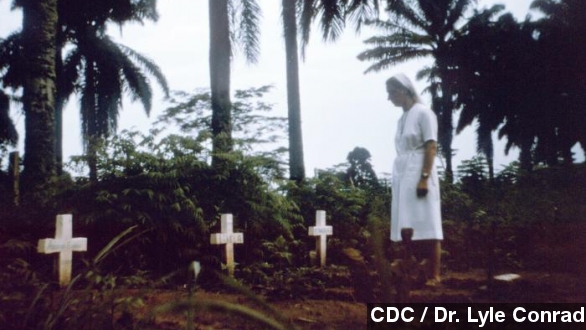Spreading across West Africa, there are now four countries that have reported the presence of the Ebola virus: Guinea, Liberia, Nigeria and Sierra Leone. In all, more than 700 people have died from the disease in recent weeks.
The New York Times reports Ernest Bai Koroma, president of Sierra Leone, has now declared a public health emergency — the Times explains the status is a call for help with quarantining those infected.
Wednesday Koroma posted a message on the presidential website saying: "The disease is beyond the scope of any one country, or community to defeat. Its social, economic, psychological and security implications require scaling up measures at international, national, inter-agency and community levels." (Via The Republic of Sierra Leone)
In the address, Koroma also announced he has canceled plans to go to the U.S. and meet with President Barack Obama for the United States-Africa summit. He will instead go to Guinea Friday to discuss what's believed to be the deadliest Ebola outbreak in history. (Via Getty Images)
So to put it into perspective of just how big this outbreak is, the second-largest Ebola outbreak in history killed 280 people — compare that to this outbreak's 729.
As this outbreak has continued to grow, so has international aid. But the risk of infection for medical staff is now so great, many volunteers are being pulled out of the affected countries.
In this age of technological and medical advancements, how has this virus grown to such alarming proportions? CNN's Dr. Sanjay Gupta blames it on a lack of education.
"Despite what we're talking about on television, they don't hear these messages. They continue to touch the bodies of people who are sick with Ebola, then get sick themselves."
And CBS notes many family members of the infected are choosing to keep loved ones at home due to the high mortality rate in clinics.
"And by causing these bodily fluids to be out there, this virus can be spread very easily. There are cases of when somebody has died and at the funeral everybody goes and touches the body. Everybody that touched the body had dies of Ebola." (Via CBS )
"Don't you guys ever worry about Ebola? Do you think that it's real?"
"No, I don't believe that Ebola is real." (Via Vice)
And that lack of understanding is also a huge issue when it comes to fighting the virus with a fatality rate as high as 90 percent.
A CDC official compares the spread to forest fires, saying: "And, like forest fires, the outbreak can be 'reseeded,' sparking onto a new patient and ravaging a new region, as long as more victims are available for contact. And despite international efforts, the fire's been hard to put out." (Via The Wire)
Those who get infected with Ebola risk a painful fate — as the virus causes internal hemorrhaging and the infected essentially bleed to death. (Via PBS)
It's believed the outbreak began in Guinea in March. There is no treatment or vaccine for Ebola, making it one of the deadliest viruses known to man.


